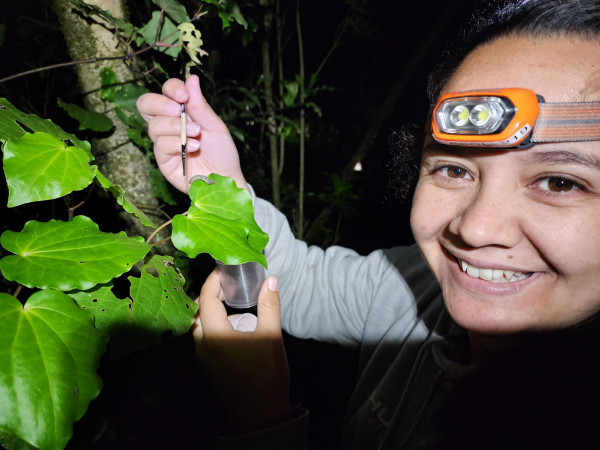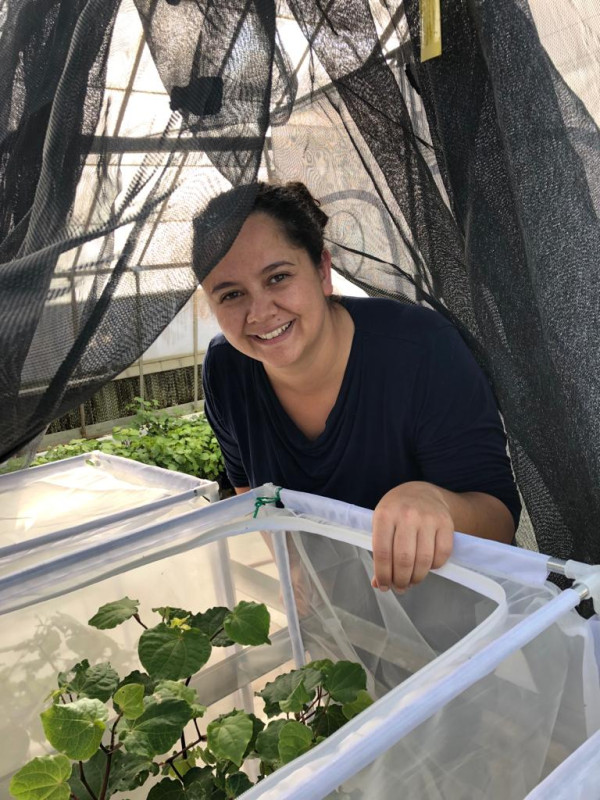Scientist profile: Chrystal O’Connor
Chrystal is applying mātauranga Māori and tikanga to all stages of her research, including how the plants are collected, euthanasia of caterpillars, and storage of samples. She hopes that her research helps to rejuvenate mātauranga around consumption of insects, a common practice for her Māori ancestors.
Chrystal grew up between Tauwhare, Ōhaupō and Cambridge, often on a dairy farm. She went to Cambridge High School, then moved to Palmerston North for her undergraduate degree. After her second year studying Animal Science, she got a Māori summer internship with AgResearch (now Te Puāwaitanga).
She says it was that summer which “gave me the introduction to science and research and what a project was, and I was like, ‘wow, this is really cool’. I love science because it can shape and grow with you.”
Her internship led to a Masters’ with AgResearch, and now a PhD, and finding a project which Chrystal is passionate about was a product of the pandemic, and a bit of luck.
“I was actually living in Australia at the time saving to go travel again and then Covid happened…it pushed me into focussing on my career and the timing just aligned.”

Chyrstal collecting samples in the field.
Her PhD, part of the Joint Postgraduate School (JPS) 2050 Food Transitions programme(external link), is a collaboration between Lincoln University, the University of Canterbury, Plant and Food, Manaaki Whenua, and AgResearch. JPS supports research working towards more sustainable food production by the year 2050.
“I love to drink milk and I love cows, but I don’t believe it’s sustainable for the future, so I wanted to move my research into that way, which is why I chose to look at eating insects. I wanted to move into something that was more sustainable and incorporated or had the ability to incorporate mātauranga and be driven the way I wanted it to.”
Chrystal is using proteomics to look for bioactive peptides - the added food value which could be gained from eating insects. Bioactive peptides have a positive impact on humans because of their health-promoting properties. For example, antihypertensive peptides can help lower blood pressure.
An initial survey consulted Māori to identify culturally significant plants and insects, as well as identifying insects which should not be eaten, according to tikanga. The results indicated a “surprisingly high” amount of people who said they would eat insects in either whole or processed form.
Huhu grubs were identified as the most commonly eaten insect. Many respondents also indicated an interest in learning more about rongoā rakau.
For the trials, Chrystal chose to use kawakawa as the caterpillar diet, because of its status as a significant and widely used rongoā rakau. She explains that from a te ao Māori perspective, it was important that the caterpillars’ natural behaviour was not forcibly changed for the trial. The caterpillar species chosen are naturally occurring on kawakawa plants.

Chrystal checks on the progress insects are making growing in a controlled environment using kawakawa.
When collecting kawakawa, the tikanga protocols from Chrystal’s iwi begin before entering the ngahere (forest). She explains the importance of visiting a forest with right-minded intentions, depending on the purpose of the collection. For example, if plants are being gathered for rongoā purposes, you may have a certain person in mind. When collecting kawakawa leaves, it is important to take only what is needed, and return any surplus.
It is customary to recite a karakia (blessing) before collecting rongoā rakau. “For Maori, rongoā isn’t just about the medicinal value from the kawakawa, it’s both spiritual and medicinal.”
When working with the caterpillar samples, one of Chrystal’s whanaunga (cousins) wrote a karakia (blessing) to be used before the caterpillars are euthanised, to release the insects’ mauri (life force). This particular karakia, “acknowledges the whakapapa of the caterpillar, the essence it can provide, and then releasing it, so then it can be used by others.”
Because she is working with taonga species (sacred species to Māori), it was important that lab samples were labelled uniquely so other researchers were aware of the added cultural significance of this work.
The application of tikanga in her research has “been a real learning journey” and she has “reached out to a lot of people” to gather information and advice on how to treat taonga species in this setting.
The storage of her samples is based on the whakapapa (genealogy) of the species. While it would not be tika (right) to store rongoā rakau next to animal faeces, for example, kawakawa and manuka could be stored together because they whakapapa to the same rehua (star). This is different to most other rakau which whakapapa to Tāne-mahuta (god of the forests and birds).
So far, no one has tasted any of the insects. Chrystal says she wants to run the caterpillars through a flavour profile, “because so many people ask me, can I just eat one?!”
She is about to start the proteomics work “which will reveal more about the nutritional compounds…if that shows good things then we’d start looking at making it a food product!”
Chrystal explains that the next logical step from her research would be to investigate the processing of edible insects, for example whether the caterpillars retained the same health properties once powdered or cooked.
There are nine insect species known to have been regularly eaten by Māori traditionally. However, the concept now seems foreign due to the lasting impacts of colonisation.
Chrystal hopes that her research can revive traditional mātauranga around insects as a valuable food source.
Footnote: Chrystal's PhD is supported by AgResearch and Lincoln University with co-supervision by Jessica Gathercole and Mark McNeill (from AgResearch) and the university's Jim Morton and Mike Bowie.